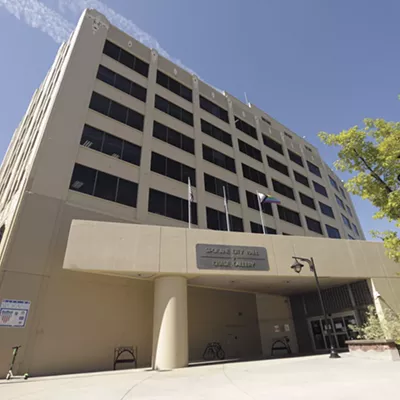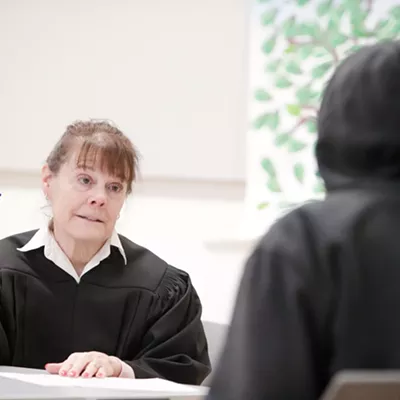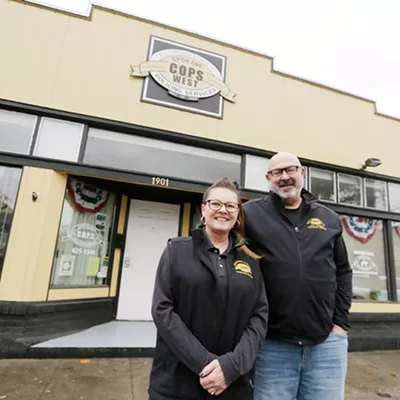
Bart Logue is a few minutes late to our interview because he's outside City Hall chatting with bicycle cops. Nothing serious, just casual small talk about how big an officer's kid had grown.
The friendliness is notable.
Over the years, Logue's job as police ombudsman has often put him at odds with the Spokane Police Department. When something goes wrong — excessive force, rude officers, an inadequate response — Logue is there to ask tough questions and monitor the department's Internal Affairs investigations.
But at the end of the day, Logue says he and the police share a mission.
"We both want the best policing experience in Spokane that we can get," Logue says. "We just have different viewpoints on how to get there."
It's been a busy year for Logue. In December, his three-person office published a report on its first ever independent investigation — the results of which kicked off a political firestorm in City Hall.
The investigation stemmed from a complaint filed by liberal City Council member Betsy Wilkerson, who said a body camera video of her interaction with police was improperly leaked to a conservative radio host in order to make her look bad. After Louge declined to certify the department's Internal Affairs investigation into the matter three times, his ombudsman's office stepped in with its own investigation.
While digging into the body camera footage, Logue stumbled across thousands of emails, many of which showed police Chief Craig Meidl regularly sharing preliminary police information with Chud Wendle and other downtown property owners.
The relationship wasn't the main focus of the complaint, but Logue still published details of the emails in his closing report — writing that they showed the chief giving "special access" to Wendle and his political allies, allowing them to "bypass procedures the public uses to request police services."
After Logue's report was made public, activists and community groups called for the chief's resignation. City Council members called for further investigation. The mayor leapt to Meidl's defense, calling the backlash an "organized attempt to disparage our police."
We sat down with Logue to ask about the controversy surrounding the investigation, as well as the Spokane Police Guild's ongoing labor contract negotiations, which could increase — or decrease — the ombudsman's powers. The interview has been edited for length and clarity.
INLANDER: When that report was published it kicked off a whole political firestorm. What has the fallout looked like from your end? Were you surprised by the reaction?
LOGUE: From our end, I'll say there's been very little fallout. I think that points to the quality of the investigation.
I don't think it would be fair for me to say there's a lot of people out there hoping that we'd fail, because I don't think that's true. But there have been a lot of people out there that want to make it difficult for us to do these things. So if we're going to finally have the opportunity to do it, we want to do it as well as we can. And I think that the investigation has withstood scrutiny.
We're sensitive to what's occurred afterwards. But we wrote our report on that investigation and — man, we reviewed a lot of stuff.
Wasn't it like 4,000 emails?
Like 4,500. A lot. And not all of them are massive, some of them are tiny. But the ones that we looked at were very focused and pointed.
I think the first time they came back with our results, it was over 13,000 or more. And we got it to 4,500, but that's a lot of stuff. And I think there was a chance to kind of have a tendency to do mission creep a little bit. You know: "Hmm this is interesting!"
Maybe we succumb to that a little bit. But we really tried to bring it back and focus on the allegation, the reason why we're doing the investigation to begin with, which is exactly what we want internal affairs to do.
Now, if we had much more broad authority probably we would have continued pushing that button and following those leads where they might go to make bigger, broader recommendations for reform.
That would have included recommendations to the city as well. In fact, one of our recommendations was to the city. It was: "Hey, what's the standard?" Because as we talked, it became clear that everyone has a different idea.
A different idea for the way records should be released?
Exactly, and I've been told very specifically by city legal what I can and cannot do. Well, if it's specific for me I'm assuming it's specific for everyone. That's not what I found as we were going through though, right?
And it seemed like the concern in the report was that it might be privileging some people over others when it comes to the ability to request information and get it quickly.
I think the key word you just said is "might."
But I think that's something that, if we had broader authority, we might follow that trail. Because maybe there's nothing to see here. But when you look at one specific thing, and it's kind of focused and you have a magnifying glass on it, it looks interesting, right? And I think the real danger with handing out lots of stuff to specific people, is there's always going to be people that don't get that same access. But are there policy violations? I don't know.
And when we were just talking about the report, I feel like I'm allowed to say we were talking about Chud Wendle and Chief Meidl and Betsy Wilkerson —
But I'm not.
And the other thing you can't do is compel testimony. That's something that came up in the report. Five police officers refused to be interviewed. Some county employees as well. Is that something you think needs to be changed?
Oh for sure.
The city would have to do that through collective bargaining and make whatever agreement. But when it comes down to it, if we're going to be assigned an investigation, we need access to the people and the information in order to do any kind of good work.
When Spokane citizens voted to create the ombudsman's office, they were voting for "full investigative authority." Do you think that's been truly achieved yet?
I can say that we've done [an independent investigation]. And it was a complicated one. I'm not sure that the structure is in place for us to be able to replicate it. So if number two comes around, everybody says, "Oh, I remember what happened last time. No way am I talking." It's very difficult to say we've met the mandate if the system isn't in place to be replicated.
So I think that testimony and access to the information inside government systems — that should be easy but we need to codify that. We need to get it in there so that it can never be interfered with.
And the police guild, that's something where the relationship with the ombudsman has been up and down —
[Laughs] More down than up.
They're negotiating their labor contract with the city, and that determines what you can and can't do.
The version we have right now is they have first right of review before we publish [closing reports]. And while they're reviewing it, if they don't like something, they come back with suggested language changes. So I'm supposed to be independent of the city and independent of the police department, definitely independent of the police guild. And in this regard with closing reports, it makes it really feel like we're not independent of them at all.
And then if I fail to do something, they're going to send it to arbitration and kind of make it seem like I'm not doing my job and call for my ouster. So they're taking it pretty seriously, which really is an attack on that structural independence of our office — at least on paper.
I don't like it. If the police guild president was sitting right here I'd say the exact same thing the exact same way, and I've said it to him numerous times. But what I can say is we've now sent about a dozen of our closing reports through them first. They've never tried to take out substantive material.
There was a video circulating recently involving a Spokane police officer arresting a homeless man, and it appears to show questionable use of force. When did you become aware of that? What has the ombudsman's involvement been up to this point?
I became aware of it within hours of it hitting Facebook and kind of going boom.
We did file a complaint on that. Actually, prior to us filing a complaint on that, I reached out and I had a conversation with assistant Chief [Justin] Lundgren. I wanted to make sure they knew that there's something percolating out there.
And during our discussion he did ask me if we were going to have a complaint filed on that, and I said that seems to be the way it's going. And he indicated that that's a great place for that to get looked at closely. So there wasn't any pushback on that.
At this stage, it's been filed, I think it's been assigned. Now they have 180 days. I doubt it will take that long in this one.
Someone mentioned during a recent ombudsman commission meeting about a desire for the ombudsman to look back at SPD's 2020 protest response.
Yeah, we've talked about that a number of times. And that'll likely never occur at this stage of the game.
I had actually approached the chief. I said: "Let us look. I recognize nobody's ever done this before. There's going to be a lot of lessons learned." And the chief originally agreed. He wrote a letter and we were going to do it. And the police guild threw a flag — filed a grievance. And for whatever reason that grievance was never resolved.
At some point, the chief sent me a letter and said, "We didn't get this result. So we'd like you to look at it, but you can't talk to anybody involved. And you can't have access to any of the information that exists." I respectfully declined. It goes back to: Do we truly have the ability to conduct an investigation? I mean, we can conduct an investigation, which does have a chance to be successful, but we can't talk to anybody and I can't look at any information. How do you even start? ♦

























